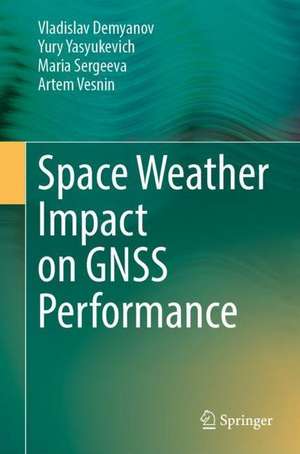Space Weather Impact on GNSS Performance
Autor Vladislav Demyanov, Yury Yasyukevich, Maria A. Sergeeva, Artem Vesninen Limba Engleză Hardback – 27 noi 2022
Given its scope, the book offers a valuable resource for GNSS users and equipment developers, as well as researchers and students whose work involves GNSS remote sensing, surveying, navigation, and related disciplines.
| Toate formatele și edițiile | Preț | Express |
|---|---|---|
| Paperback (1) | 800.39 lei 38-44 zile | |
| Springer International Publishing – 27 noi 2023 | 800.39 lei 38-44 zile | |
| Hardback (1) | 957.98 lei 3-5 săpt. | |
| Springer International Publishing – 27 noi 2022 | 957.98 lei 3-5 săpt. |
Preț: 957.98 lei
Preț vechi: 1168.26 lei
-18% Nou
Puncte Express: 1437
Preț estimativ în valută:
183.30€ • 191.40$ • 151.37£
183.30€ • 191.40$ • 151.37£
Carte disponibilă
Livrare economică 25 martie-08 aprilie
Preluare comenzi: 021 569.72.76
Specificații
ISBN-13: 9783031158735
ISBN-10: 3031158733
Pagini: 368
Ilustrații: XII, 368 p. 171 illus., 134 illus. in color.
Dimensiuni: 155 x 235 mm
Greutate: 0.8 kg
Ediția:1st ed. 2022
Editura: Springer International Publishing
Colecția Springer
Locul publicării:Cham, Switzerland
ISBN-10: 3031158733
Pagini: 368
Ilustrații: XII, 368 p. 171 illus., 134 illus. in color.
Dimensiuni: 155 x 235 mm
Greutate: 0.8 kg
Ediția:1st ed. 2022
Editura: Springer International Publishing
Colecția Springer
Locul publicării:Cham, Switzerland
Cuprins
Introduction.- GNSS Overview.- Space Weather General Concepts.- Methodology for GNSS Capability Analysis.- Experimental Results of GNSS/SBAS Performance Under Space Weather Impacts.- Real-Time Data Assimilation for Space Weather Effects Mitigation on GNSS/SBAS.- How to Improve GNSS/SBAS Reliability Under Space Weather Impacts: Analysis.
Notă biografică
Vladislav Demyanov, graduated as Ph.D. in Radio wave physics from Irkutsk State University in 2000. He received his Doctor of Science degree in ragio-engineering from Siberian Federal University (Krasnoyarsk city, Russia) in 2011. Now, he is a senior researcher at the Institute of Solar-Terrestrial Physics of Siberian Branch of Russian Academy of Science. Besides he works for both Irkutsk State Transport University and Irkutsk State University as a professor. His research interests include Space Weather impacts on the ionosphere and telecommunication systems (including its transportation applications), GNSS instrumentation for the ionosphere studies.
Yury V. Yasyukevich received his Ph.D. degree in radio physics from Institute of Solar-Terrestrial Physics of Siberian Branch of Russian Academy of Sciences (ISTP SB RAS) in 2009. He works at the ISTP SB RAS as a leading researcher and at Irkutsk state university as an associate professor. His scientific interests include GNSS-ionosphere, space weather impact on GNSS, absolute total electron content. He is a PI of SIMuRG project (http://simurg.iszf.irk.ru).
Maria A. Sergeeva received her Ph.D. degree in St.Petersburg State University of Aerospace Instrumentation. Now, she is a researcher at the Mexican Space Weather Service and the National Laboratory of Space Weather, Mexico. Her research interests include Space Weather impacts on the ionosphere, ground-based and space-based instrumentation for the ionosphere studies.
Artem Vesnin Ph.D. fellow is Researcher of Institute of Solar and Terrestrial Physics SB RAS. His scientific interests include the absolute total electron content measurements and the development of the project “System for Ionosphere Monitoring and Research from GNSS” (SIMuRG).
Textul de pe ultima copertă
This book addresses problems of GNSS performance support under geomagnetic storms and solar radio bursts. It analyses both physical and radio-engineering sources of GNSS performance deterioration caused by geomagnetic storms, solar radio bursts and peculiarities of the polar and equatorial ionosphere. The book takes into consideration both standalone GNSS and differential GNSS. Based on experimental data analysis, it presents a systematic approach to maintaining reliable GNSS performance despite the Space Weather impacts.
Given its scope, the book offers a valuable resource for GNSS users and equipment developers, as well as researchers and students whose work involves GNSS remote sensing, surveying, navigation, and related disciplines.
Caracteristici
Summarizes the most important studies on a complex interdisciplinary problem
Explains the main features of GNSS/SBAS techniques under irregular external influences
Offers concise information on the main problems affecting today’s GNSS/SBAS technologies
Explains the main features of GNSS/SBAS techniques under irregular external influences
Offers concise information on the main problems affecting today’s GNSS/SBAS technologies
